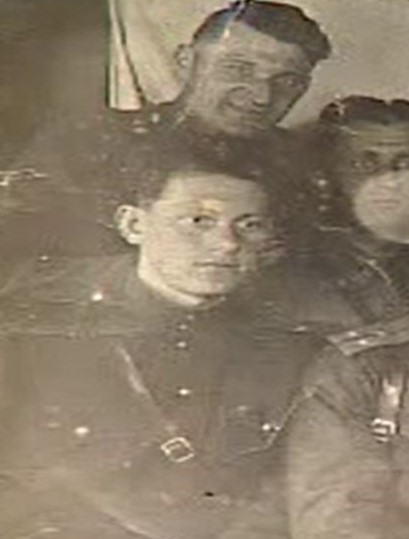Mordukh Tsaur was born in 1921 in Mena, fifty kilometers east of Chernihiv, northern Ukraine. His father Lazar was a cabinetmaker, while his mother was a homemaker. In 1926 or 1927, the family moved to Chernihiv. They were religious. Mordukh finished six classes of a Yiddish school, which was then reorganized into a Ukrainian one. After completing his seventh grade, he became apprenticed to a projectionist at the town's "Shchors" movie theater, eventually being promoted to the position of projectionist.
In June 1941, following the outbreak of the Soviet-German War, Mordukh Tsaur volunteered to enlist in the Red Army. He was immediately sent to a military school in Kharkiv, which was evacuated to Tashkent, Uzbekistan, two months later. In late 1941, he was discharged from the school and attached to the 69th Division, as the head of the chemical service of one of its regiments, in the rank of lieutenant. In April 1942, his regiment was deployed in the Kaluga Region (southwest of Moscow), which was then the scene of heavy fighting against the German and Hungarian forces, with neither side being able to gain decisive advantage. Tsaur recalls 1that he experienced antisemitism on the front lines. Many soldiers claimed that the Jews were not fighting in the war, preferring to "hide behind the backs of Russian soldiers." Stung by this malicious gossip, Tsaur vowed to fight better than his non-Jewish comrades, to disprove these allegations.
On August 18, 1943, Mordukh Tsaur volunteered to go on a reconnaissance assignment, in the course of which his squad had to blow up the local railway at two points. The squad was ambushed; Tsaur's men were killed, and he himself was wounded and taken prisoner.
Over the following two years, Tsaur passed through a succession of POW camps in Germany. In Stalag I-B Hohenstein, East Prussia, the Nazis carried out a search for Jews, checking which inmates were circumcised. Tsaur was saved from imminent death by a fellow non-Jewish POW, who had come forward to be examined instead of him. In March 1945, Tsaur and several of his comrades escaped from the Luckenwalde POW camp south of Berlin. They managed to reach Czechoslovakia, where they were met by the advancing Red Army. As a former POW, Tsaur was subjected to a lengthy screening process – first in Soviet-occupied Germany, and then in the USSR itself. In 1946, having been cleared of suspicion, he was discharged from the military in the rank of senior lieutenant.
Tsaur was not awarded any decorations in the course of the war. He received two medals in the postwar period.
After the end of the war, Mordukh Tsaur returned to Chernihiv.
Memories of the wartime
"At this time,the men began to say that the Jews were a people that hid behind the backs of Russian soldiers, and I decided that I had to prove myself. I was untrained [for reconnaissance work], having been educated as a chemist, but I was sent [to do reconnaissance].… [The commander] summoned me and said: 'It seems that you are eager to prove yourself, so here is a task for you. You are to lead a group of seventeen men and blow up the railway at two points.'… I did as I was told; we carried out our assignment, blowing up the railway at two points, but we were ambushed on our way back."2







